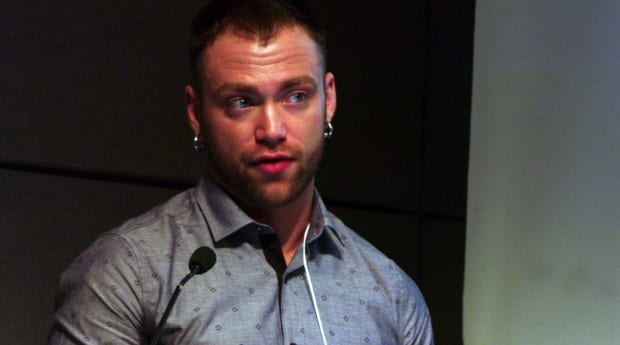Ten years after its launch in Vancouver, graduates of a sexual health leadership program for young gay men are leading initiatives across Canada to help their peers speak to each other without shame.
On Nov 5, 2015, some of the initiatives’ facilitators presented their latest work to the annual BC Gay Men’s Health Summit in Vancouver.
“There’s this real burning energy that emerges from the guys who graduate from the program and you really need to tap that,” says Jared Star, who coordinates the Totally Outright program at the Rainbow Resource Centre in Winnipeg.
“You need to harness it, you need to support it, you need to facilitate it because it’s beautiful and really good things come from it, as you can see.”
Winnipeg’s Totally Outright program is now two years old and has already produced 45 graduates of its own. Star told the summit about this year’s project, which seeks to address isolation and disconnection within Winnipeg’s gay, bisexual and two-spirit community.
“The guys in the program this year really zoned in on this idea of, you know, you make out with a guy on Saturday and you see him on Sunday at a café and he won’t even look at you. He doesn’t even acknowledge you,” he says.
“This was really a concrete way of capturing the feeling that exists in Winnipeg — that I think is really unique to Winnipeg — because of the lack of social spaces for gay men to gather and because of a lot of other things,” he says.
The project is called Don’t Let Shame Decide:
(A trailer for the Don’t Let Shame Decide campaign from the Rainbow Resource Centre in Winnipeg.)
“The guys in the program, they wanted to do something about it,” Star says. “They’re really sick of it. They wanted to look at it, they wanted to investigate it and they wanted to come up with some kind of intervention.”
So they produced a short documentary featuring gay, bisexual, queer and two-spirit Winnipegers describing their experiences with isolation, homophobia, biphobia and racism. The film was screened at the Reel Pride GLBTTQ* Film Festival in October 2015.
Star says that a post-screening community dialogue attracted more than 100 participants.
“We showed the video and the dialogue, although it was only an hour, was very intense and passionate and there was people from all different parts of our community talking about why young guys don’t connect with each other,” Star says.
The success of Winnipeg’s Don’t Let Shame Decide inspired the Totally Outright participants in Vancouver to develop a similar initiative.
In March 2015 the Health Initiative for Men launched its Think Before You Type campaign, which was conceived by its Totally Outright group, in an effort to foster dialogue among gay men about stigma on gay dating and hookup websites.
“Gay, bi, MSM [men who have sex with men] adolescents are coming of age in environments where harassment, bullying are kind of everyday norms for many,” notes Joshua Edward from the Health Initiative for Men. “Are they finding anything really different in gay communities, and especially those online ones?”
Edward’s colleague, Michael Kwag, describes the Vancouver group’s online campaign as a first step to promote positive social norms for gay and bisexual men on dating and hook-up sites.
“Specifically to reduce online shaming and stigmatization around things like age, ethnicity, HIV status, body size and masculinity,” he says.
Think Before You Type is particularly interested in starting a conversation among guys about the ways they engage with each other online, and the question of sexual discrimination based on race, or sexual racism.
“Among gay and bisexual men, sexual racism is a highly contentious issue because of this idea that it’s not racism; it’s preference,” Edward says. “So people will say, ‘I don’t feel like I should have to apologize for the fact that I only like white guys.’
“However, we know that the ways that men categorize or identify their preference in online interactions with other men has real potential for offline impacts,” he says.
“I think what we’re trying to get at with Think Before You Type is addressing this idea that you automatically just exclude wholesale, entire segments and categories of our population of people — who you might like if you had a chance to know them,” he says.

 Why you can trust Xtra
Why you can trust Xtra


